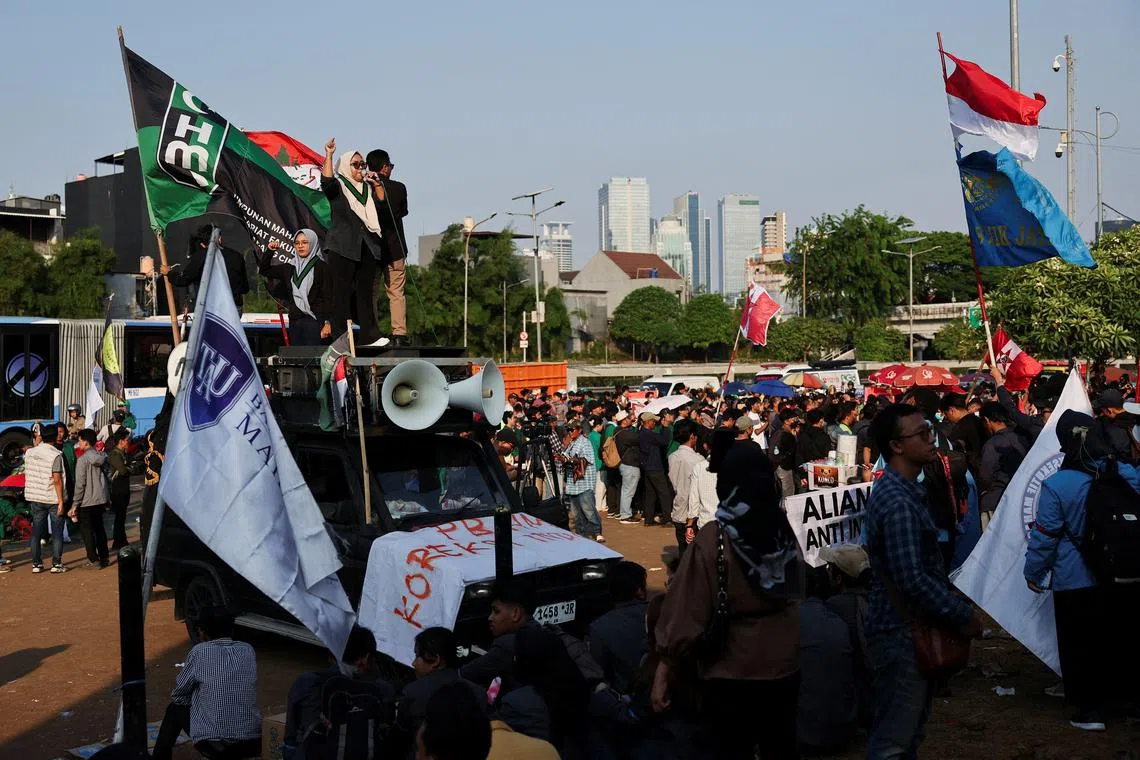Indonesia police fire tear gas, rubber bullets at student protesters
Sign up now: Get ST's newsletters delivered to your inbox

University students gathering outside Indonesia's Parliament building during a protest against parliamentarians' extra pay and housing allowances, in Jakarta, on Sept 1.
PHOTO: REUTERS
Follow topic:
BANDUNG – Indonesian police fired tear gas and rubber bullets at protesters near two universities in the city of Bandung, student groups and authorities said on Sept 2, stoking concerns over unrest in which 10 people have been killed since last week.
The protests began in the capital Jakarta, targeting government spending such as enhanced perks for lawmakers, and have since spread nationwide.
They escalated into rioting and looting after a police vehicle hit and killed a motorcycle taxi driver
University students have long been regarded as vanguards of Indonesia’s democracy, having taken a leading role in protests that helped topple authoritarian leader Suharto in 1998.
The incident in Bandung was the first instance of police firing at demonstrators on or near university campuses during the current protests, with previous clashes in and around government buildings and officials’ residences.
President Prabowo Subianto warned on Sept 1 that the police and military would stand firm against violent escalations.
Police official Hendra Rochmawan said the authorities did not enter the campuses of the Islamic University of Bandung, or Unisba, and nearby Pasundan University, more than 140km from Jakarta, on the night of Sept 1, but tried to break up crowds of “non-student protesters” around the premises.
The Unisba student body accused security forces of seeking to silence dissent, saying they “brutally attacked” the campus.
Student groups at Pasundan shared a similar account on social media.
“We feel campuses are no longer safe for students... When military or security officers came into our campuses, then there is no longer a safe zone for us,” Mr Raviv Tuanku Alsaid, head of Islamic Students Union at the university, told Reuters.
Pasundan student Yoga Tadiyalaga Ruchiyat said students were angry and had found at least 40 tear gas shells on their campus.
“We were here as paramedics to help if protesters got injured, but the police fired tear gas (at us),” he said.
One Unisba student was critically injured when hit by rubber bullets on his campus and was undergoing surgery, Mr Raviv said.
Mr Prabowo had talks with labour unions, some of whom joined demonstrations last week calling for a hike in the minimum wage, and said he told lawmakers to discuss labour laws, according to a statement from his office.
Mr Said Iqbal, the head of the Indonesia Trade Union Confederation, told a press conference that he had informed Mr Prabowo of workers’ demands, such as an end to cheap labour, job outsourcing and income tax cuts.

University students attending a protest against parliamentarians’ extra pay and housing allowances in Jakarta on Sept 1.
PHOTO: REUTERS
Analysts say the protests test Mr Prabowo’s young presidency, which nears its first anniversary in October.
Growing inequality among Indonesians has contributed to the rising protests, said Mr Achmad Sukarsono, associate director at consultancy Control Risks, citing a recent allowance for lawmakers that stoked public resentment.
“The growing gap between the rich and poor in Indonesia provides an easily combustible dry-hay situation. Policies that fail to consider social sensitivities like the perks for parliamentarians then turn into matchsticks,” he said.
Indonesia’s official human rights body voiced concern over security forces’ handling of the protests and is conducting an investigation, its commissioner Anis Hidayah told journalists.
The security response has also been criticised by international organisations.
The United Nations rights office called for accusations of rights violations by security forces to be investigated.
Indonesians added pink and green hues to their social media profile pictures in response to the protests, with some using the hashtag #ResetIndonesia and listing 25 demands for the government, including ending police brutality and ensuring decent wages for the public. REUTERS

